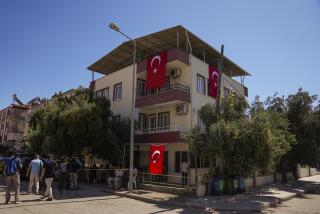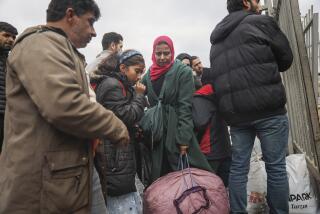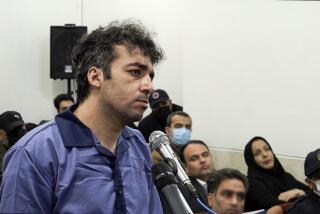Turkey Probes Slayings of 2 Kurds by Security Forces
- Share via
ANKARA, Turkey — The Turkish parliament and government officials began separate investigations Monday into security forces’ killings of a 12-year- old boy and his father, both accused of belonging to a Kurdish rebel group.
After the Nov. 21 slayings in the southeastern town of Kiziltepe, the provincial governor, Temel Kocaklar, said that “two armed terrorists” plotting attacks against military targets had died in a shootout with security forces.
For the record:
12:00 a.m. Dec. 8, 2004 For The Record
Los Angeles Times Wednesday December 08, 2004 Home Edition Main News Part A Page 2 National Desk 0 inches; 32 words Type of Material: Correction
Turkey’s death penalty -- An article in the Nov. 30 Section A said, in some copies, that Turkey had abolished its death penalty five years ago. It was abolished two years ago.
But according to human rights activists, who looked into the deaths, Ahmet Kaymaz, 31, and his son Ugur were probably unarmed and may have been killed mistakenly.
In the wake of the killings, tensions between authorities and locals in Kiziltepe have been rising. On Sunday, hundreds of demonstrators calling for Kocaklar’s resignation clashed with police, and at least three were arrested and jailed on charges of disrupting public order.
The controversy comes before a crucial European Union summit Dec. 17, when EU leaders are set to decide whether to launch accession talks with Turkey.
Citing Turkey’s poor human rights record, the EU has long spurned Ankara’s demands for membership. Abuses have been especially prevalent in heavily Kurdish eastern Turkey, where rebels have led a 15-year insurgency for independence.
The rebels called off their campaign for an independent Kurdish state after the capture of their leader, Abdullah Ocalan, in 1999. But they resumed their fight in September, saying Turkey had rejected their calls to negotiate a lasting peace.
Despite that setback, the Turkish government has kept up a flurry of legal reforms, winning strong praise from EU governments. The changes include stiffer penalties for torturers and broader cultural freedoms for Kurds.
But human rights groups have accused Turkish leaders of failing to enforce the new laws. Such concerns are frequently echoed by EU diplomats in the Turkish capital, who criticized the government for not taking immediate action to investigate the Kiziltepe killings.
Huseyin Guler, one of the lawmakers investigating the incident, pledged a full account. “We will report on the incident in fullest detail,” he said before setting off for Kiziltepe.
As the lawmakers were meeting with the Kaymaz family, officials in the province of Hakkari, farther east, began investigating claims that a 19-year-old shepherd had been shot dead Saturday by security forces as he was tending his herd. Family members said military personnel refused to hand over the body unless they signed papers confirming that he was a terrorist. They refused.
At the same time, the government is facing calls for an inquiry into a mass grave found this month outside Alaca village in another southeastern province, Diyarbakir. Villagers allege that the remains belong to residents who disappeared in 1993 after being arrested by the army.
“These are all examples of how the government fails to stand behind its own policies,” said Yusuf Alatas, chairman of Turkey’s Human Rights Assn., which conducted its own investigation of the Kiziltepe killings.
But other commentators say the government is being sabotaged by rogue elements within the state who stand to lose influence if Turkey joins the European Union. “The Kiziltepe tragedy must be assessed in this light,” said Serafettin Elci, a veteran Kurdish politician.
According to the Human Rights Assn. report, Kaymaz and his son were shot dead while carrying blankets to Kaymaz’s truck, parked outside their house. Kaymaz, who had no police record, made a living transporting fuel to Iraq and had been about to set off on another trip.
“The death penalty was abolished ... yet Turkish citizens continue to be executed on the streets without any justification,” Ahmet Kaymaz’s brother, Resat, said in a telephone interview.
The prosecutor handling the case told rights groups that the police had been watching the Kaymaz house for some time on suspicion that rebels had been hiding out there. Although acknowledging that authorities were aware that a family with four children was living in the house, she said that Ahmet Kaymaz and his son had opened fire on security forces first and had perished in an ensuing shootout.
The autopsy found 13 bullets in the body of Ugur Kaymaz and eight in the body of his father. A neighbor, who was asked by police to identify Ugur immediately after the incident, said the boy was lying in a pool of blood near the truck and that his right hand was resting “awkwardly” on a rifle.
The neighbor, Ahmet Tekin, said police were “stunned” when he told them that Ugur was his pupil at primary school. “They kept asking me if I was sure,” Tekin told the daily Radikal in an interview published Monday. “I told them I had no doubts whatsoever.”
More to Read
Sign up for Essential California
The most important California stories and recommendations in your inbox every morning.
You may occasionally receive promotional content from the Los Angeles Times.










